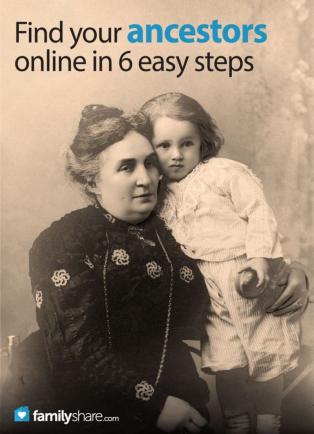
Once requiring cumbersome research, genealogy has been made more accessible to the casual hobbyist thanks to the internet. The amount of information uploaded regularly is increasing geometrically.
Years ago, genealogical research required painstaking forms, trips to graveyards, libraries and church archives and, sometimes, a significant financial burden. Now, with access to a networked computer a time investment can take you far. Records of all sorts can be easily retrieved online and personal genealogies can be safely stored there as well. Genealogy can be a rewarding and fascinating activity involving the whole family.
Getting started is easy. A program for storing the information you have collected is all that is needed. There are programs like Family Tree that can be loaded onto the computer, or you can opt for a website such as Ancestry.com to store data. Storing the information online is sensible because it means no worrying about back-ups.
Take what names and dates you have and that's it! You are ready to go. You have only to navigate the web. For that purpose, here are some very useful web tips to get started with:
Use a search engine
The first and most useful tool is a simple web search using Google, Bing, or some other search engine. Have you ever Googled your name to discover what information is online about you? That is the basic idea, except use your ancestor's names. Of course, the better information you have when you start your search, the better the result. If you have an uncommon last name you will marvel at how quickly you can hone in on useful information. However, if you have a common surname, you will receive an unmanageable amount of likely unrelated data. To limit this problem add significant information like a birth or death date of your ancestor, the street they lived on or country they emigrated from. The more specifics you have the more likely you will have success.
Use commonly known genealogy websites
I find www.ancestry.com and familysearch.org most useful. These websites contain tremendous amounts of information, giving access to vital records, census data, immigration records, military records, and family genealogies. They are also awesome because you may find one of your ancestral lines has already been extensively researched and you can benefit from the work of others by simply connecting the dots.
Search for immigration records
To find information on ancestors you know have immigrated to the United States from Europe in the 19th and 20th centuries, www.ellisisland.org is a great website. You can find passenger lists, including the ships your ancestors traveled on, and the port of their departure and arrival.
Search for photo records
Treasures can also be found on www.findagrave.com. You may be able to locate where one of your ancestors is buried, and often there are photographs or other bits of information that will lead you to clues about birth dates, spouses, children, and so on.
Search state resources
If you know what state they were born, lived, or died in, www.ancestralsearch.com lists web resources by state.
Search for church archives
Once you have some clues about your ancestors, you can find church archives and historical records useful. For example, if you know a particular ancestor came to the United States from Germany and belonged to the Moravian Church, you can look for historical records related to German migrations and check the church archives to see if you can locate information on your ancestors. Sometimes this information is in another language. Google Chrome is one internet browser that automatically translates a webpage into your native language.
The amount of information uploaded regularly is exploding, so do not give up. An ancestor you cannot find today, you may find six months from now. With the help of the internet, anyone can do their genealogy. Just a few seeds of information can expand into a tree of success.

